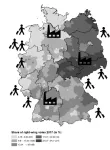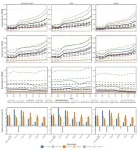(Press-News.org) An international survey study involving more than 23,000 higher education students reveals trends in how they use and experience ChatGPT, highlighting both positive perceptions and awareness of the AI chatbot’s limitations. Dejan Ravšelj of the University of Ljubljana, Slovenia, and colleagues present these findings in the open-access journal PLOS One on February 5, 2025.
Prior research suggests that ChatGPT can enhance learning, despite concerns about its role in academic integrity, potential impacts on critical thinking, and occasionally inaccurate responses. However, the few studies exploring student perceptions of ChatGPT in higher education have been limited in scope. Ravšelj and colleagues designed an anonymous online survey study aiming to provide a broader view.
From October 2023 to February 2024—a period soon after the public release of ChatGPT in late 2022—23,218 students representing 109 countries and territories took the survey, which asked about perceptions of various aspects of ChatGPT, such as how they use it, ethical concerns, and views on its potential labor market impacts.
Analysis of the survey results revealed several trends. For instance, overall, participants tended to feel positively about ChatGPT, finding it valuable for brainstorming, summarizing texts, academic writing, and simplifying complex information. However, they reported concerns about ChatGPT’s reliability, its potential to erode critical thinking skills, and ethical issues around its use, such as cheating and privacy. While participants reported a preference for human interaction, they anticipated rising demand for AI-related skills.
Interestingly, less than a third of students (29%) reported using ChatGPT for brainstorming, and only one in ten (11%) for creative writing. However, most students (70%) found ChatGPT interesting to use, and a quarter (25%) found it easier to interact with ChatGPT than with colleagues.
The students’ perceptions varied across sociodemographic and geographic factors. For instance, those in lower-income regions were more likely to perceive ChatGPT as essential support in the context of limited educational resources, while students in high-income regions placed greater value on ChatGPT’s innovative and advanced features.
In all, the researchers note, these findings could help inform the design of higher education curricula and policies to harness the benefits of ChatGPT equitably across diverse student populations. Future research could address some of this study’s limitations, such as by tracking students’ perceptions over time and including more students from low-income countries.
The authors add: “A new milestone in generative artificial intelligence research in higher education: Early global perceptions of ChatGPT, drawn from over 23,000 students across 109 countries and territories, highlight its role as an engaging learning tool while raising ethical concerns that require further attention. The study examines student perspectives on its usage, capabilities, regulation, satisfaction, attitudes, study outcomes, skills development, labor market implications, and emotional responses.”
In your coverage, please use this URL to provide access to the freely available article in PLOS One: https://plos.io/40HWLCZ
Citation: Ravšelj D, Keržič D, Tomaževič N, Umek L, Brezovar N, A. Iahad N, et al. (2025) Higher education students’ perceptions of ChatGPT: A global study of early reactions. PLoS ONE 20(2): e0315011. https://doi.org/10.1371/journal.pone.0315011
Author countries: Slovenia, Malaysia, Tanzania, Russia, Guatemala, Saudi Arabia, Egypt, Spain, Ghana, Romania, Türkiye, Chile, Tunisia, Slovakia, Republic of North Macedonia, Brazil, Italy, Zambia, Ecuador, Colombia, China, Cyprus, Romania, Mexico, Portugal, Canada, Croatia, Indonesia, Philippines, Jordan, Japan, Luxembourg, Bangladesh, Austria, Bosnia and Herzegovina, Nigeria, Georgia, India, Palestine, Ukraine, Bulgaria, Latvia, Mozambique, Rwanda, Albania, Thailand, Israel, Poland, Cape Verde, U.K., Serbia, Algeria, Estonia, Zimbabwe
Funding: The authors acknowledge the financial support from the Slovenian Research and Innovation Agency (research core funding No. P5-0093 and project No. Z5-4569). The funders had no role in study design, data collection and analysis, decision to publish, or preparation of the manuscript.
END
Students around the world find ChatGPT useful, but also express concerns
International study surveys 23,000 higher education students about use and perception of popular AI tool
2025-02-05
ELSE PRESS RELEASES FROM THIS DATE:
Labor market immigrants moving to Germany are less likely to make their first choice of residence in regions where xenophobic attitudes, measured by right-wing party support and xenophobic violence, a
2025-02-05
Labor market immigrants moving to Germany are less likely to make their first choice of residence in regions where xenophobic attitudes, measured by right-wing party support and xenophobic violence, are stronger, per 2004-2017 data
Article URL: https://plos.io/4g9rxcy
Article title: Do xenophobic attitudes influence migrant workers’ regional location choice?
Author countries: Germany
Funding: The author(s) received no specific funding for this work. END ...
Lots of screentime in toddlers is linked with worse language skills, but educational content and screen use accompanied by adults might help, per study across 19 Latin American countries
2025-02-05
Lots of screentime in toddlers is linked with worse language skills, but educational content and screen use accompanied by adults might help, per study across 19 Latin American countries
Article URL: https://plos.io/4h7A68R
Article title: Use of screens, books and adults’ interactions on toddler’s language and motor skills: A cross-cultural study among 19 Latin American countries from different SES
Author countries: Argentina, Colombia, Perú, Ecuador, Nicaragua, Costa Rica, Panamá, Brazil, Chile, México, Paraguay, Bolivia, Guatemala, Cuba, Venezuela, ...
The early roots of carnival? Research reveals evidence of seasonal celebrations in pre-colonial Brazil
2025-02-05
Pre-colonial people in Brazil may have gathered in summer months to feast on migratory fish and share alcoholic drinks, a new study suggests.
An international team – involving scientists from the University of York, UK; the Universitat Autònoma de Barcelona, Spain, and the Universidade Federal de Pelotas in Brazil – analysed pottery fragments dating back to between 2300 and 1200 years ago which were discovered around the Patos Lagoon in Brazil.
The shores of the Lagoon are characterised by settled earthen mounds, known as “Cerritos” which were built by pre-colonial ancestors of Pampean Indigenous ...
Meteorite discovery challenges long-held theories on Earth’s missing elements
2025-02-05
Understanding where Earth’s essential elements came from—and why some are missing—has long puzzled scientists. Now, a new study reveals a surprising twist in the story of our planet’s formation.
A new study led by Arizona State University’s Assistant Professor Damanveer Grewal from the School of Molecular Sciences and School of Earth and Space Exploration, in collaboration with researchers from Caltech, Rice University, and MIT, challenges traditional theories about why Earth and Mars are depleted in moderately volatile elements (MVEs). MVEs like copper and zinc play a crucial role in planetary chemistry, often accompanying life-essential ...
Clean air policies having unintended impact driving up wetland methane emissions by up to 34 million tonnes
2025-02-05
Reducing sulphur in the air may inadvertently increase natural emissions of methane from wetlands such as peatlands and swamps, a new study has found.
The findings published today in the journal Science Advances suggests that the decline of global sulphur emissions as the result of clean air policies, coupled with the warming and fertilization effects of carbon dioxide emissions lifts a lid on wetland methane production resulting in increased emissions.
The resulting additional future release of 20-34 ...
Scientists simulate asteroid collision effects on climate and plants
2025-02-05
A new climate modeling study published in the journal Science Advances by researchers from the IBS Center for Climate Physics (ICCP) at Pusan National University in South Korea presents a new scenario of how climate and life on our planet would change in response to a potential future strike of a medium-sized (~500 m) asteroid.
The solar system is full of objects with near-Earth orbits. Most of them do not pose any threat to Earth, but some of them have been identified as objects of interest with non-negligible collision probabilities. Among them is the asteroid Bennu with a diameter of about 500 m, which, according to recent studies ...
The Wistar Institute scientists discover new weapon to fight treatment-resistant melanoma
2025-02-05
PHILADELPHIA — (February 5, 2025) —The lab of The Wistar Institute’s Jessie Villanueva, Ph.D., has identified a new strategy for attacking treatment-resistant melanoma: inhibiting the gene S6K2. The team published their findings in the paper, “Selective abrogation of S6K2 identifies lipid homeostasis as a survival vulnerability in MAPKi-resistant NRASMUT melanoma,” from the journal Science Translational Medicine.
“This work shows that, even in the face of notoriously ...
Fool yourself: People unknowingly cheat on tasks to feel smarter, healthier
2025-02-05
UNIVERSITY PARK, Pa. — Fool me once, shame on you. Fool myself, and I may end up feeling smarter, according to a new study led by Sara Dommer, assistant professor of marketing at Penn State.
Dommer wondered why people cheat on tasks like completing crossword puzzles or Wordle and counting calories when the rewards are purely intrinsic, like feeling smarter or healthier. She found that when cheating offers the opportunity to improve self-perception, individuals engage in diagnostic self-deception — that is, they cheat yet deceive themselves by attributing their heightened performance to their innate ability instead ...
Rapid increase in early-onset type 2 diabetes in China highlights urgent public health challenges
2025-02-05
A new study led by researchers from Peking University, published in Health Data Science, reveals a sharp rise in the burden of early-onset type 2 diabetes (T2D) among adolescents and young adults in China from 1990 to 2021. Despite improvements in mortality rates, the incidence and disability-adjusted life years (DALYs) associated with the disease have grown alarmingly.
Using data from the Global Burden of Disease (GBD) Study 2021, the study shows that the age-standardized incidence rate nearly doubled, increasing from 140.20 per 100,000 in 1990 to 315.97 per 100,000 in 2021, with an average annual percentage change ...
Researchers discover the brain cells that tell you to stop eating
2025-02-05
NEW YORK, NY (Feb. 5, 2025)--Columbia scientists have found specialized neurons in the brains of mice that order the animals to stop eating.
Though many feeding circuits in the brain are known to play a role in monitoring food intake, the neurons in those circuits do not make the final decision to cease eating a meal.
The neurons identified by the Columbia scientists, a new element of these circuits, are located in the brainstem, the oldest part of the vertebrate brain. Their discovery could lead ...
LAST 30 PRESS RELEASES:
Hope for global banana farming in genetic discovery
Mirror image pheromones help beetles swipe right
Prenatal lead exposure related to worse cognitive function in adults
Research alert: Understanding substance use across the full spectrum of sexual identity
Pekingese, Shih Tzu and Staffordshire Bull Terrier among twelve dog breeds at risk of serious breathing condition
Selected dog breeds with most breathing trouble identified in new study
Interplay of class and gender may influence social judgments differently between cultures
Pollen counts can be predicted by machine learning models using meteorological data with more than 80% accuracy even a week ahead, for both grass and birch tree pollen, which could be key in effective
Rewriting our understanding of early hominin dispersal to Eurasia
Rising simultaneous wildfire risk compromises international firefighting efforts
Honey bee "dance floors" can be accurately located with a new method, mapping where in the hive forager bees perform waggle dances to signal the location of pollen and nectar for their nestmates
Exercise and nutritional drinks can reduce the need for care in dementia
Michelson Medical Research Foundation awards $750,000 to rising immunology leaders
SfN announces Early Career Policy Ambassadors Class of 2026
Spiritual practices strongly associated with reduced risk for hazardous alcohol and drug use
Novel vaccine protects against C. diff disease and recurrence
An “electrical” circadian clock balances growth between shoots and roots
Largest study of rare skin cancer in Mexican patients shows its more complex than previously thought
Colonists dredged away Sydney’s natural oyster reefs. Now science knows how best to restore them.
Joint and independent associations of gestational diabetes and depression with childhood obesity
Spirituality and harmful or hazardous alcohol and other drug use
New plastic material could solve energy storage challenge, researchers report
Mapping protein production in brain cells yields new insights for brain disease
Exposing a hidden anchor for HIV replication
Can Europe be climate-neutral by 2050? New monitor tracks the pace of the energy transition
Major heart attack study reveals ‘survival paradox’: Frail men at higher risk of death than women despite better treatment
Medicare patients get different stroke care depending on plan, analysis reveals
Polyploidy-induced senescence may drive aging, tissue repair, and cancer risk
Study shows that treating patients with lifestyle medicine may help reduce clinician burnout
Experimental and numerical framework for acoustic streaming prediction in mid-air phased arrays
[Press-News.org] Students around the world find ChatGPT useful, but also express concernsInternational study surveys 23,000 higher education students about use and perception of popular AI tool







